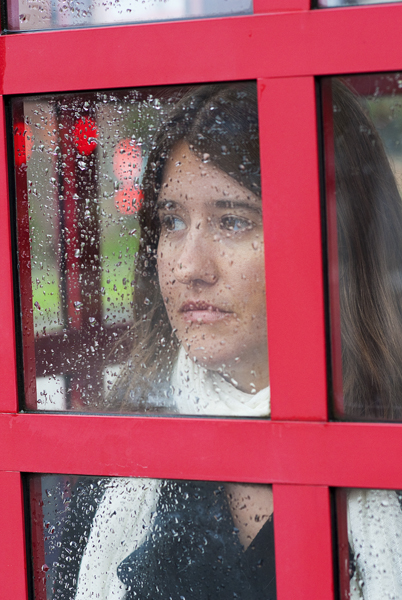Free-Falling? Nothing Is Free.
By David McGee
THE NOCTURNAL AMONG US
Anna Coogan
Anna CooganA long time ago, when he was discussing the actors in his classic film The Last Picture Show, director Peter Bogdanovich commented as to how Timothy Bottoms had “the saddest eyes I’ve ever seen.” On the back of The Nocturnal Among Us, Anna Coogan is shown staring with a faraway look through a raindrop-speckled window, and hers are the saddest eyes you will ever see. Eternally sad, it appears. Even on the inside sleeve, where the Seattle native is pictured out on the street in winter, she’s almost smiling, but her eyes are this close to tearing up. As you make your way through the compelling songs she’s assembled for The Nocturnal Among Us, you find yourself awaiting light to break through—not for you, but for Anna. It’s almost there, in an instant, in the elevated, soaring, multi-voiced choruses of “Dreaming My Life Away” and its catchy “oh-la-la-la” chants over a jittery, pulsating rhythmic charge. But the song chronicles ennui of an epic magnitude—plans are made, the protagonist awakes and gets ready for the new day…then climbs back in bed, “wished I was dreaming,” and everywhere, it seems, is the recurrent motif, “Look at me dreaming my life away,” sung not with regret, but almost cheerily, as if stasis is triumph. The tender sentiments set amidst an anticipatory mood in the folk-flavored music rising and falling in “Crooked Sea” suggest hope anew—“when we awake we will see/rays of sun on the balcony”—but by the third verse, we find Ms. Coogan singing in the past tense: “when you left you left no warning/a missing suitcase, an empty bed/a closet full of clothes you left/a cupboard full and an empty desk/an aching heart beating in my chest.” After attending a Wreckers/Keith Urban show and being “amazed by the sheer power of a huge country music show,” as she writes on her website, Ms. Coogan was inspired to write a country breakup song. The result, “Take The Sky and Run,” does indeed channel the restless, surging energy of some Wreckers tunes, but it is more bereft than most country breakup songs; in fact, it falls not so much in the category of “breakup” song as it does “kissoff” song, itself an exalted realm and rather more pitiless than a breakup song. In “Take the Sky and Run,” she’s breaking up and cutting loose, staying out late on a Friday, “not gonna think of your face anymore, gonna settle our score,” and finally kisses off her faithless paramour with the final lyric: “I don’t need you in my world, baby.” The jazz-inflected ballad “Mockingbird,” is kind of a prequel to “Take the Sky and Run,” unfolding as a bitter chronicle of a relationship not merely winding down but exploding off its hinges—at least for the female half of the couple, whose plight might be likened to that of the astronaut in Kubrick’s 2001: A Space Odyssey cut loose from his pod by the computer HAL and sent free-falling forever into deep space—or, as Ms. Coogan puts it, “everything I do is just free-falling.” Tragedy (the death of a friend with whom Ms. Coogan had “a rocky relationship, we fought a lot, and I was intimidated as hell by him”) is the subject of “So Long, Summertime,” but even here, in looking back, the artist cannot summonwistful memories—“you didn’t know up from down/and you didn’t know right from wrong/and you cannot undo what’s been done”—perhaps because she knows on some fundamental level she’s still connected to him, as she admits in the final verse when she vows to be there, if he ever calls again, which in and of itself is an admission of disturbing codependency.
Anna Coogan performs ‘Crooked Sea,’ from The Nocturnal Among Us. Live in Luzern, Switzerland’s 2009 Blue Balls Festival.For all its revelations of emotional devastation, though, The Nocturnal Among Us is not the downer it might seem from this appraisal. It’s more thought provoking in its ruthless examination of the whys and wherefores of things coming apart, of people disconnecting; and the subtlety of the arrangements and JD Foster’s evocative soundscapes offer a beautiful, compelling backdrop for the various dramas under investigation. Not the least of her music’s attributes is Ms. Coogan’s voice, which has the timbre and affecting catch in the throat of the young Natalie Merchant. It’s something a listener cannot turn away from, a voice that insists on being heard, not by dint of sheer volume—exuberant displays of vocal brio are not part of the program—but by its pronounced, persistent, aching vulnerability. It articulates the vast, inchoate sadness her eyes betray. But in the end, maybe what’s important in the long run is the absence of tears flowing from those orbs; the tears, beyond her gaze, are the tears from Heaven spotting the window pane she stands behind. The distance between the two may be the big story after all.
Founder/Publisher/Editor: David McGee
Contributing Editors: Billy Altman, Laura Fissinger, Christopher Hill, Derk Richardson
Logo Design: John Mendelsohn (www.johnmendelsohn.com)
Website Design: Kieran McGee (www.kieranmcgee.com)
Staff Photographers: Audrey Harrod (Louisville, KY; www.flickr.com/audreyharrod), Alicia Zappier (New York)
E-mail: thebluegrassspecial@gmail.com
Mailing Address: David McGee, 201 W. 85 St.—5B, New York, NY 10024



